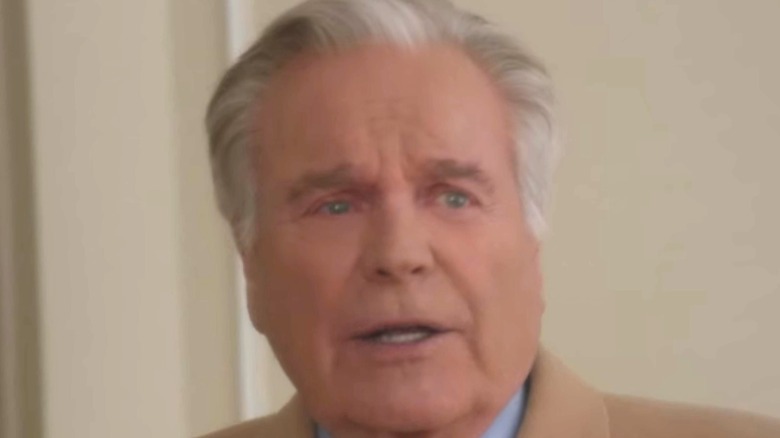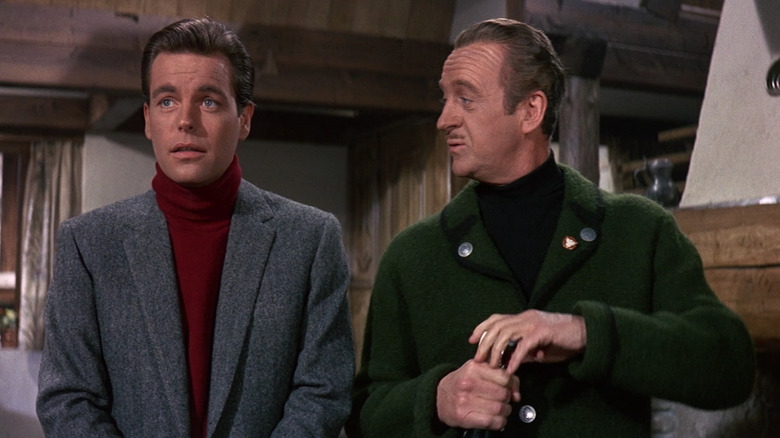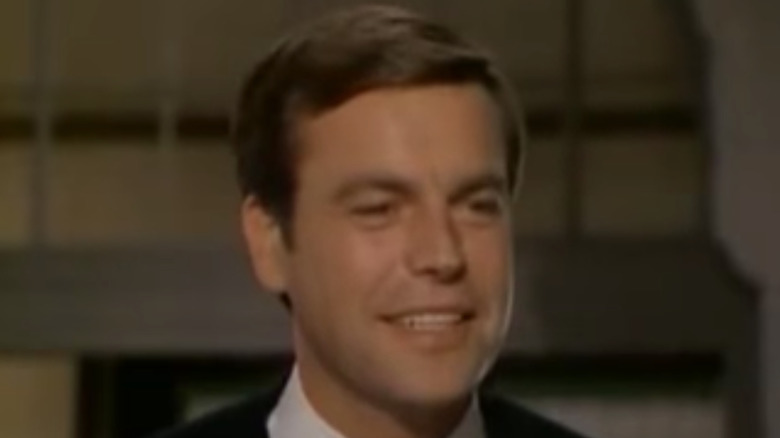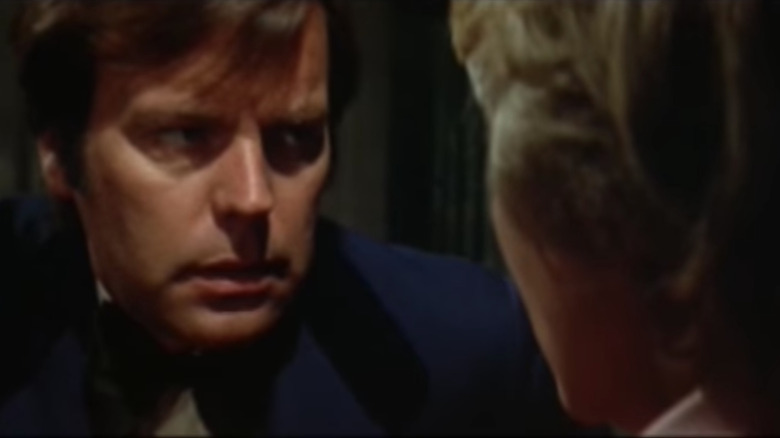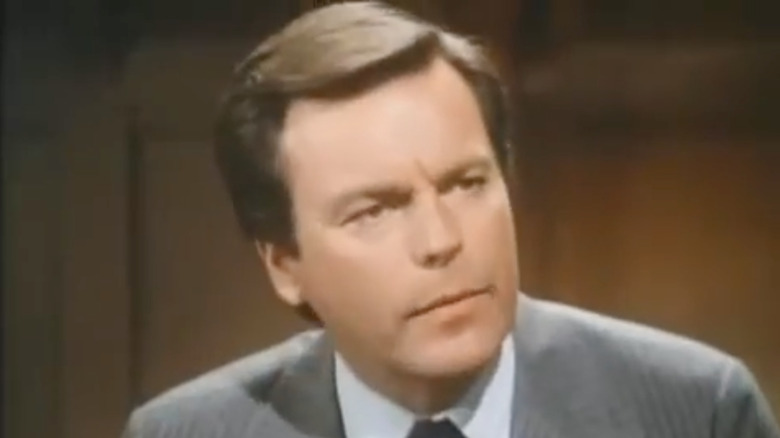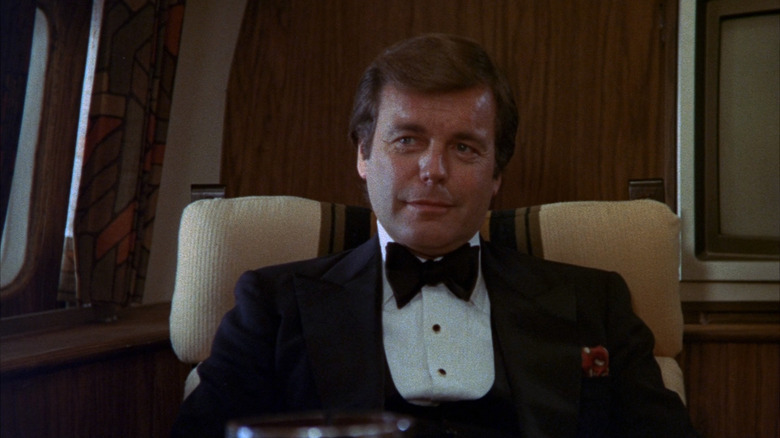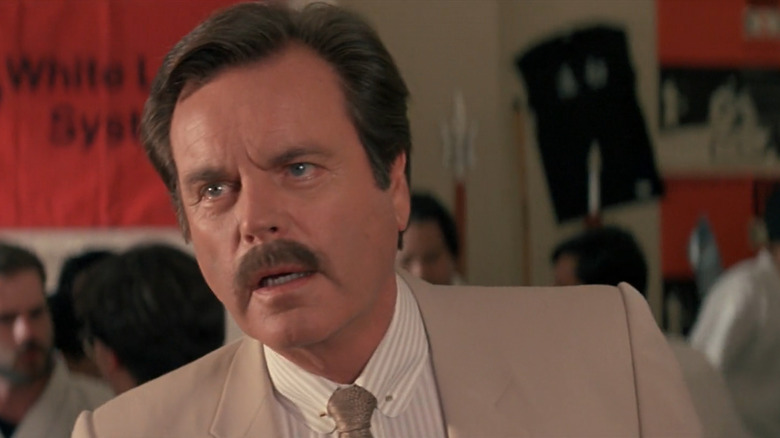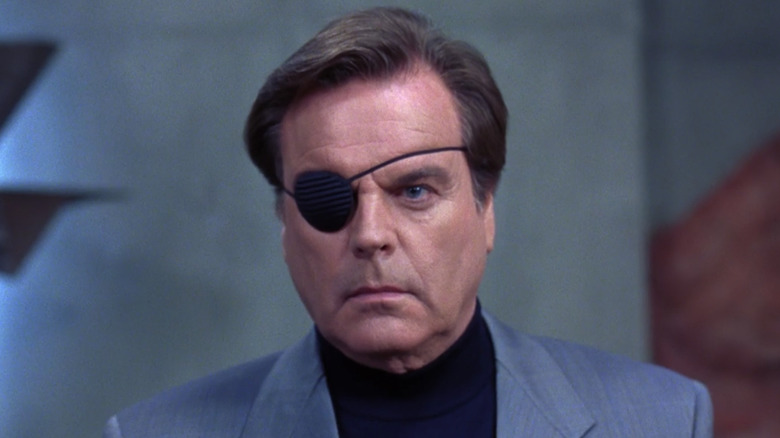Why Anthony DiNozzo Sr. From NCIS Looks So Familiar
We may receive a commission on purchases made from links.
Over the course of the last 19 seasons, "NCIS" has amassed an impressive list of special guest stars. From Bob Newhart to Billy Dee Williams, you never quite know when a Hollywood legend might just stroll through the famous bullpen. One of the longest-running guest-star roles on the series belongs to Anthony DiNozzo Sr., portrayed by legendary actor Robert Wagner.
Wagner made his first appearance as the father of NCIS Special Agent Anthony DiNozzo Jr. (Michael Weatherly) in Season 7, Episode 12 ("Flesh and Blood"). The popularity of Wagner's character led the crew to invite him back for at least one episode of the next nine seasons, including two episodes of Seasons 12, 13, and 14. Notably, Wagner continued appearing on the series even after Weatherly's Season 13 departure. Though he's been noticeably absent since Season 16, reports indicate that the "NCIS" team would love to have Wagner back, just as soon as they can assure the elder thespian's safety amidst the COVID-19 pandemic.
Wagner has been a mainstay of Hollywood for decades, with a career that began all the way back in 1950. In the years since, Wagner has appeared in everything from comedies to dramas and everything in between. It's difficult to nail down exactly which production you might recognize such a prolific performer, but here's a quick look at some of Wagner's most memorable roles from the last seven decades.
Wagner played George Lytton in two Pink Panther movies
During the course of his career, Wagner has appeared in more than 150 different productions (via IMDb). In his first two decades of work, Wagner appeared in a variety of notable films, including 1953's "Titanic," 1957's "The True Story of Jesse James," and 1962's "The Longest Day." However, the earliest film property that today's audiences are most likely to remember him for is "The Pink Panther."
Long before Steve Martin took on the role of the bumbling detective, actor Peter Sellers starred as Inspector Jacques Clouseau in six different films. The first film, released in 1963, also co-starred Robert Wagner as George Lytton, the spoiled nephew of Sir Charles Lytton (David Niven) (aka the Phantom, an infamous jewel thief). At the beginning of the film, George is unaware of his uncle's secret life, but is secretly drowning in debt. After George learns of his uncle's true nature, he realizes the potential fortune in his future and opts to join in his uncle's criminal activities. At the end of the film, George and Sir Charles leave the Pink Panther diamond with Clouseau and depart for another heist in South America.
Two decades after his first appearance in the franchise, Wagner returned to the role in 1983's "Curse of the Pink Panther," joined once again by Niven. This film ends in a fashion similar to the original, with one notable difference. This time, the Lyttons escape with the Pink Panther in hand.
He was a series regular on 1968's It Takes a Thief
Five years after he starred in "The Pink Panther," Wagner was cast in his first long-term television role. From 1968 to 1970, Wagner portrayed Alexander "Al" Mundy, the central protagonist on ABC's "It Takes a Thief." In the pilot episode of the series, Al is sprung from prison and offered the opportunity to redirect his skills in the art of thievery to aid the United States government.
By the end of the series, Wagner had appeared in a total of 66 episodes, far and away the most of any cast member. For the first two seasons, Wagner was joined in each episode by Malachi Throne, who portrayed Al's boss, Noah Bain. However, in the third season, Throne was replaced by "12 Angry Men" actor Edward Binns (via IMDb).
The third season also featured numerous appearances by actor, musician and dancer Fred Astaire, who played Al's father, Alistair Mundy (aka the Panther, another infamous thief). Because of Astaire's legendary prominence in Hollywood at this time, his character largely took over the lead role of the episodes in which he starred, with Wagner's screen time greatly diminished (via PopMatters). Notably, "It Takes a Thief" was not Wagner's only collaboration with Astaire in the 1970s.
Though it might seem fun to imagine an episode of "NCIS" led by Wagner, instead of the regular cast members, it seems doubtful that anything like that would happen on television today.
Wagner was one of the Towering Inferno's many victims
After "It Takes a Thief" ended in 1970, Wagner spent the next few years splitting time between short television roles and big movie appearances. After two seasons alongside future fellow "NCIS" alum David McCallum on the British drama series "Colditz," Wagner made a relatively short appearance in 1974's "The Towering Inferno," a disaster movie about a San Francisco-based skyscraper that catches fire.
In the movie, Wagner plays Dan Bigelow, the chief public relations officer of Glass Tower, the newest and tallest building in the world. Despite Wagner's lack of screen time, Bigelow actually plays a crucial role in the film. Eager to attract as many eyes as possible, Bigelow uses the building's dedication ceremony as an excuse to turn on all the lights in the building. However, because of faulty wiring, a fire erupts on the 81st floor. As the fire spreads, it kills numerous people, including Bigelow and his mistress, Lorrie (Susan Flannery).
Though Wagner's role in the film is a short one, it put him on the big screen with a plethora of fellow A-listers, including: Paul Newman, Steve McQueen, William Holden, Faye Dunaway, Fred Astaire, Susan Blakely, Richard Chamberlain, Dabney Coleman, Robert Vaughn, O. J. Simpson, Susan Flannery, Gregory Sierra, and Jennifer Jones (via IMDb).
He played Pete T. Ryan in Switch
In 1975, Wagner started work on a CBS series with a premise notably similar to his prior role on ABC's "It Takes a Thief." For a total of three seasons, Wagner starred in "Switch," a series focused on Frank "Mac" MacBride (Eddie Albert), a former detective, and Peterson T. "Pete" Ryan (Wagner), a former con man. After the latter's release from prison, the two join forces to form a detective agency which reutilizes Pete's confidence-man tricks for good. The two co-workers, polar opposites in many ways, always manage to get the job done before the end of an episode, but often struggle with each other just as much as any criminal.
According to Diana Maychick and L. Avon Borgo's 1986 biography of Wagner (via Google Books), Wagner and Albert didn't care much for the storylines on the series, but enjoyed the relationship between their respective characters. Though Wagner and Albert were the only cast members to appear in every episode of the series, they were regularly joined onscreen by Charlie Callas, Sharon Gless, William Bryant, James Hong, and Mindi Miller.
The series was canceled in August 1978, having aired a total of 71 episodes throughout its run (via IMDb).
Wagner played Jonathan Hart in Hart to Hart
Next to his recurring role on "NCIS," Wagner's most well-known television job is his role as Jonathan Hart on ABC's "Hart to Hart." The series focused on a married couple whose rich, glamorous lifestyle often led them into regular interactions with criminals. Beginning in 1979, Wagner starred as one-half of the dynamic duo, with Stefanie Powers taking on the role of Jennifer Hart. Like many of his other television roles, "Hart to Hart" placed Wagner at the center of a mystery series.
When "Hart to Hart" came to an end in 1984, it had aired a total of 111 episodes across five seasons, certainly a notable achievement for any network television series (via IMDb). However, the life of the franchise was only just beginning. Beginning in 1993, Wagner and Powers returned for a series of TV movies, all released in relatively short order. "Hart to Hart Returns" aired on ABC on November 5, 1993 and was followed by "Home Is Where the Hart Is" only three short months later. ABC quickly saw success with these films and decided they wanted more, releasing two in 1994, two in 1995, and a final two in 1996 (via Amazon).
The last movie was released exactly 17 years after the pilot episode of the original series (via IMDb).
He played a television producer in Dragon: The Bruce Lee Story
In between the end of the "Hart to Hart" TV series and the beginning of the "Hart to Hart" movies, Wagner made a small appearance in "Dragon: The Bruce Lee Story." The film, which stars Jason Scott Lee (no relation) and Lauren Holly (another future "NCIS" alum), portrays the life of legendary actor and martial artist Bruce Lee. After relocating to the United States, Lee finds success as a martial arts teacher, but faces a number of hardships along the way, including racism and a debilitating back injury which threatens to end his career. Lee's big break into Hollywood comes after much perseverance.
After winning a difficult fight, Lee is approached by Bill Krieger, a man who claims to be a TV producer. Krieger tells Lee that he'd like to hire him for an upcoming series called "The Green Hornet." Lee quickly accepts and finds himself at the center of a whole new world with Krieger as his guide. Sadly, "The Green Hornet" is canceled after only a single season and plans for a "Kung Fu" series, potentially starring Lee, are taken in a different direction. Lee and Krieger suffer a falling out after David Carradine is hired in his place. However, Krieger invites Lee to a new project titled "Enter the Dragon," a film he promises is Lee's "ticket back to America."
"The Bruce Lee Story" probably isn't Wagner's most well-known film role, but given the success of the film, it's certainly a notable job in the famous thespian's long career.
He was Dr. Evil's Number Two in the Austin Powers movies
If you clicked on this article thinking,"Robert Wagner looks familiar, but his face is missing something," you might be remembering him from his role in the "Austin Powers" film series. Starting in 1997 with "Austin Powers: International Man of Mystery," New Line Cinema released three different movies centered on the habitually aroused spy. In addition to the numerous roles played by Mike Meyers himself, the franchise also borrows the talents of a slew of notable Hollywood stars, including Wagner.
In the film series, Wagner portrays Number Two, the second in command to Dr. Evil (Mike Meyers). Throughout each stage of every failed plot by the criminal mastermind, Number Two is often seen as the most competent of the group. He is easily annoyed by his boss's plans, which he openly labels as silly and childish. However, Number Two seems to go along with most instructions anyway, albeit with a liberal use of eye rolls. His most well-known physical characteristic is his eyepatch, a tool which is known to grant its wearer X-ray vision (via Austin Powers Fandom).
Wagner portrayed Number Two again in 1999's "Austin Powers: The Spy Who Shagged Me" and last played the role in 2002's "Austin Powers in Goldmember" (via IMDb).
